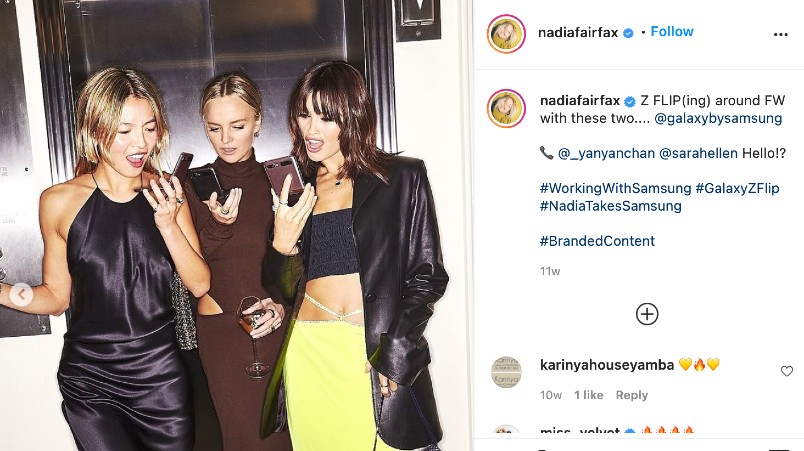Galaxy strikes back: Samsung fights ruling by Ad Standards for unpaid influencer post, fears over 'broader implications’

Nadia Fairfax-Wayne posted the image above on June 2, which has since been updated to include "#BrandedContent".
Samsung will test the limits of Ad Standards’ crackdown on influencer advertising for the first time. It was called out by the regulatory body after a high-profile Instagrammer shared a post promoting its products for free. The consumer electronics giant is fighting the ruling.
What you need to know:
- Ad Standards says Samsung breached the advertising Code of Ethics for a post by Instagram influencer Nadia FairfaxWayne, despite Samsung not paying for the post – or even knowing it was being shared.
- Samsung says it will appeal the decision, and is “concerned by the broader implications of the finding”.
- The post was not explicitly part of any commercial deal, tagged Samsung, and included the hashtag “#WorkingWithSamsung”, but was found to be advertising that was not clearly labelled.
- Samsung was working with the influencer at the time, but this specific post was not part of the deal.
- Ad Standards said its community panel was split, but the majority felt #WorkingWithSamsung could mean more than just a commercial arrangement, and that the post was not organic.
Samsung says it will appeal a ruling by Ad Standards that found the company in breach of the advertising Code of Ethics for an influencer post it did not pay for.
The tech company said it “respectfully disagrees” and is “concerned by the broader implications” of a decision that found a post from an Instagram influencer that tagged Samsung constituted an advertisement.
On June 2 this year, Nadia Fairfax-Wayne, an influencer with roughly 200,000 followers, posted two photos with two friends holding Samsung phones.
“Z FLIP(ing) around FW with these two…. @galaxybysamsung @_yanyanchan @sarahellen Hello!? #WorkingWithSamsung #GalaxyZFlip #NadiaTakesSamsung,” she wrote as the caption, which has since been updated to include “#BrandedContent”.
In a statement to Ad Standards, Samsung said that while it had contracted Fairfax-Wayne to promote their folding phones for the Afterpay Australian Fashion Week event in early June, a “post was not part of the deliverables under the AAFW engagement between Ms Fairfax and Samsung”.
“Samsung’s position is that the Post is not advertising. However, if the Post is deemed to be advertising, Samsung submits that it is appropriately distinguishable as advertising,” the company wrote.
The post was “created and uploaded by Ms Fairfax on her own initiative and Samsung did not have prior knowledge of it”. There were sponsored posts as part of their deal, and those were appropriately marked as “sponsored” or “paid partnership”.
Citing previous decisions by Ad Standards relating to Anna Heinrich and Crown, and Zoe Foster Blake’s work with Tourism Australia, Samsung argued while the post was Fairfax-Wayne’s own it clearly marked “#WorkingWithSamsung”. A complaint about Heinrich’s post, which included “#crownpartner”, was dismissed.
“The Panel has upheld complaints where the only disclosure has been to tag the advertiser,” Samsung said. “However, in this case, while Ms Fairfax did tag an official Samsung account, she also went further, adding a range of hashtags which make the commercial nature of the content abundantly clear.”
In response, Ad Standards noted its Community Panel was split. A minority of the Panel felt the hashtag #WorkingWithSamsung demonstrated a relationship between Fairfax-Wayne and the brand. The majority disagreed.
“The Panel considered that the motivation for Ms Fairfax to post, although not explicitly part of an agreement, was related to the ongoing commercial relationship between Ms Fairfax and the brand, and was not organic content,” Ad Standards found.
Ad Standards has been cracking down on how content creators and influencers advertise on social media, stating that phrases like “#ad”, “#sponsored” or “#advertisement” is necessary to make the nature of the post clear. In June, it called out Unilever for failing to label the post correctly, while last month it made its first TikTok ruling that a drinking funnel was promoting dangerous drinking.
In this case, Samsung said it was “concerned by the broader implications of the finding” given it was not aware of the post before it was published.
“In the circumstances, Samsung intends to request an independent review of the Community Panel’s determination in accordance with Ad Standards’ independent review process,” Samsung said.
